Last Updated December 1, 2023:
What are the pros and cons of water softener? You are at the right blog spot if you want an answer to this query. Water softeners effectively remove the hardness from water, but they have a few downsides. Here, I will discuss both the positive and negative aspects and share the alternatives to these systems. Let’s not waste any time and get into details!
Read my article – Ultimate Guide to Water Softeners: Everything You Need to Know.
Table of Contents
Quick Answer
To give you a quick overview, water softeners have become a basic necessity because unfortunately, soft water is not available widely. But these systems have advantages and disadvantages. Here’s a glimpse of important highlights:
- They can remove the metal contaminants from hard water, eventually increasing the appliances’ lifespan and saving resources on cleaning products.
- On the downside, these systems have a negative impact on the environment if the waste is not dumped properly. Also, the annual maintenance cost is between $100 and $250.
These are just the basics of softeners. Continue reading as I will explain their 3 types. Also, based on experience, I will shed light on the harmful effects of hard water. Moreover, I will list some alternatives to the softening system. So, without any delay, let’s dive deeper into this informative guide.
What is a Water Softener, and How does it Work?
A water softener is a filtration system that removes minerals like calcium and magnesium from hard water. When you look inside the hood of a water softener, it works via a bed of ion-exchange resin beads, having sodium ions on their surface.
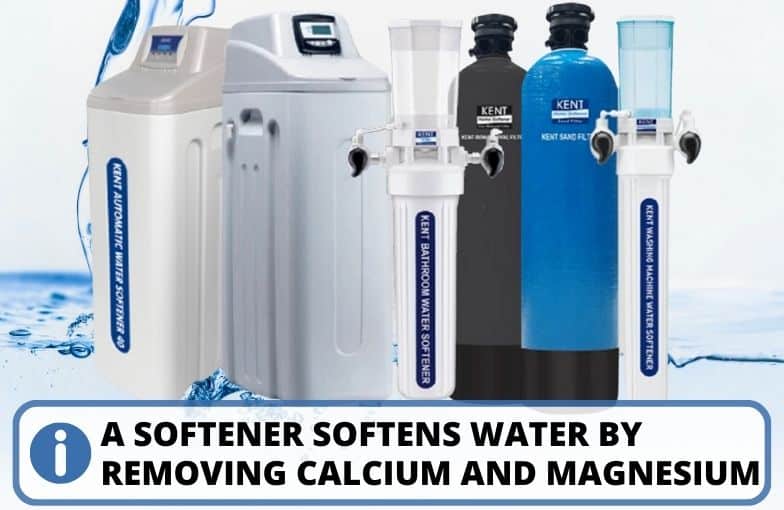
Generally, when hard water enters the mineral water tank, calcium and magnesium charges are trapped by this sodium ion. A chemical reaction occurs that swaps these hard minerals. In this way, you get soft water, deprived of any hardness-causing substance.

3 Common Water Softeners Advantages
Listed below are the advantages of getting a water softener:
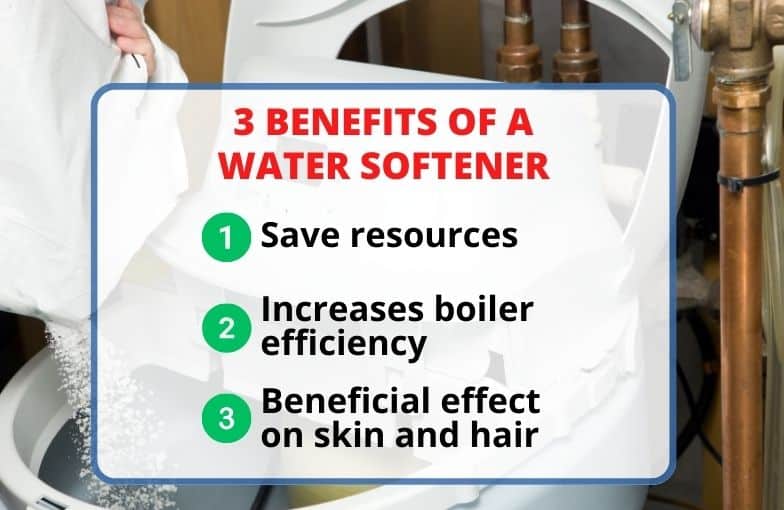
1. Saves Resources
Hard water stains appliances and the presence of magnesium and calcium charges in it make it difficult for soap, shampoos, and detergent to produce the lather. As a result, they badly affect the cleaning process, and the appliances and clothes have stains even after washing them.
With the help of soft softeners, you can do laundry and general cleaning effectively and they will consume less detergent, saving money on resources.
2. Increase Boilers Efficiency
Hard water contains minerals that can clog the pipes, and the scales formed by the hard water act as insulation. This limits the heat transfer and can decrease the boiler efficiency by up to 50%.
A water softener comes really handy in this situation as it will provide the boiler and water heater with soft water. As a result, your water heater will work efficiently and won’t waste energy.
3. Better Hair and Skin
Hard water can cause lime scales buildup on the hair and skin which causes dryness. Your hair will be rough, and you’ll also notice the hair fall in extreme cases.
On the other hand, water softener removes the scales and minerals from water, which makes your hair look shiny and smoother. Also, when the minerals aren’t building up on the skin, your skin will give a fresh look.
Related article: 7 Types of Water Softeners: Which One Is Right for You? – Water Treatment
3 Common Water Softener Disadvantages
So far, our discussion has been entirely biased towards the pros of the softeners. But do they have any disadvantages? Yes, despite their benefits, these softeners also have some drawbacks, including:

1. Cost Incurred
Water softening systems need regular maintenance and will cost you anything between $100 to $250. Secondly, these systems need regular addition of salt in them. Based on my experience, a 40lb. salt bag is enough for most households in a month, and it usually costs between $5 to $25, depending on the salt you use.
2. Negative Impact on the Environment
If the softened water is released into the environment or the salt waste is dumped in the fields or on the ground, it can increase the soil’s acidity level. So, it’s the responsibility of water softener owners to avoid giving such water to plants and save the environment by dumping it properly.
3. Potential Health Risks
People with dietary mineral requirements should be aware that soft water eliminates minerals like magnesium and calcium and adds sodium ions instead of it. People with low-sodium diets can get sick with drinking water.
Moreover, it can cause cardiovascular disorders like high blood pressure. Therefore, those needing calcium and magnesium should get the minerals from other food sources to stay healthy.
An In-depth Analysis of Pros and Cons of Water Softeners by Type
The other day, my sister-in-law, who lived in Minneapolis, called me because she and her family were so worried due to the hard water issue. She was continuously complaining about the scale buildup and dry skin. So, I recommended that she get the water softener as these systems can get rid of these symptoms.
I was amazed by her level of curiosity as she didn’t know a thing about the softeners. So I explained everything to her and which one would be suitable for her. This made me realize that I should also share this piece of information with my readers. Therefore, I’ll discuss 3 common types of water softeners along with their pros and cons:
1. Salt Based Water Softeners
It is the most common type of water softener, also known as an ion exchange unit. As the name suggests, these systems use salt, like sodium, to soften the water. The ions present in the salt react with the hard water and replace the unwanted mineral charges.
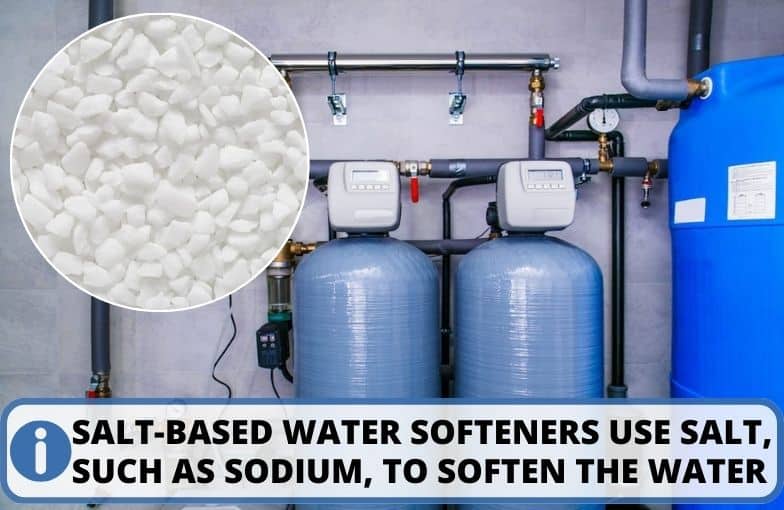
Pros and Cons
Listed below are the perks and downsides of getting salt-based softening systems:
- They provide the most effective solution against hard water by removing dissolved metals like magnesium and iron and other minerals like calcium.
- The resin beads come with a life span of 10 years, and with proper maintenance, they can even last up to 20 years.
- The first thing I don’t like about them is that their cleaning cycle takes time, and they waste water during this process.
- These systems need regular maintenance for optimal performance, and you’d have to load in the salt after some time, like 4 – 8 weeks.
2. Salt-Free Water Softeners
These types of systems use the potassium chloride instead of the sodium. They crystallize the hard minerals in water and don’t let them pass through the pipes. These are called salt-free water conditioners because they specialize in filtering calcium.
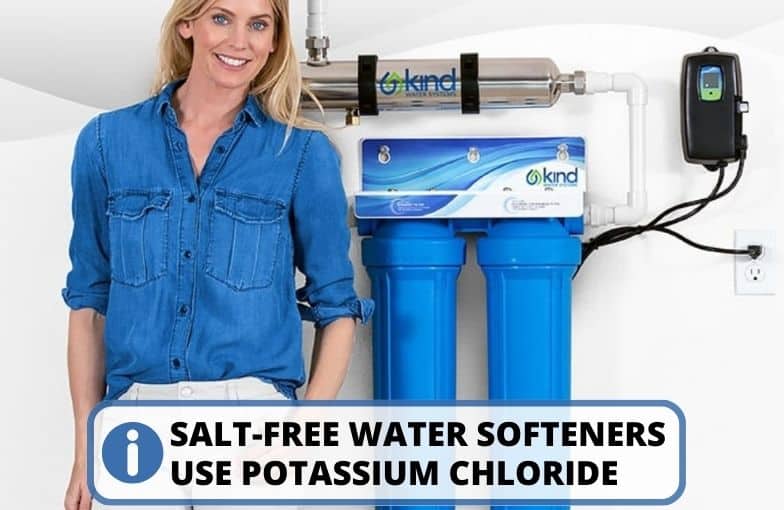
Pros and Cons
Following are the upsides and drawbacks of salt-free softening systems:
- They don’t need electricity or salt to operate, making them eco-friendly.
- No regeneration process occurs in these, so water doesn’t get wasted.
- They have a limited lifespan and last up to 6 years only.
- They don’t possess the ability to remove dissolved metals like magnesium. Therefore, water will be still hard to some extent.
3. Dual-Tank Water Softeners
Dual-tank or twin-tank water softener systems work on the same principle as salt-based ones. I prefer these softeners because they can remove hard minerals 24/7.
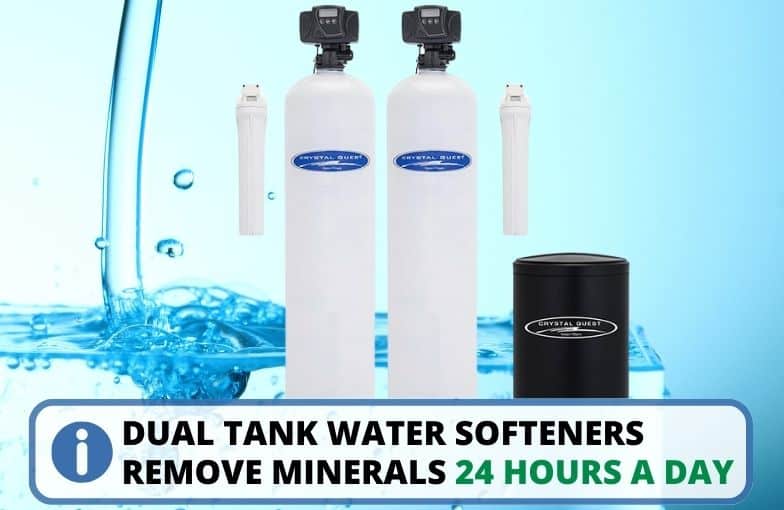
They consist of two tanks, a resin tank, and a brine tank:
- The resin tank: It is relatively large, and that is where the actual softening process takes place.
- The brine tank: Resin beads are stored in the brine tank or a brine solution consisting of water and salt. Its main purpose is regeneration, which removes the hard minerals.
Pros and Cons
Here are the advantages and disadvantages of these systems:
- What I love most about these systems is that they provide a soft water supply 24/7.
- These systems are more efficient than single-tank systems.
- These systems cost more than the traditional ones.
- Because of the dual tank, they need more space.
After a quick comparison, here comes a question: should you go with a water softener? Let’s answer your query with the help of the perks and tradeoffs of a water softener.
Read Also: 5 Hard Water Pros and Cons – Benefits of Soft Water – Water Treatment
Are Water Softeners Worth It?
Deciding if water softeners are worth the investment requires examining their benefits and weighing them against the potential drawbacks. In this section, we will delve into the advantages of these devices and discuss how they can improve your quality of life.
1. Provide Soft Water
A Water softener is highly effective at transforming hard water into soft water, making daily household tasks like cleaning and laundry easier.
2. Minimal Maintenance
One of the most appealing features of the softeners is the minimal upkeep they require after installation. Periodic salt top-ups and occasional system checks are needed to keep the softener running optimally.
3. Remove Low Levels of Iron
In addition to softening water, some ferrous iron water softeners, such as SpringWell WSSS Filter & Softener Combo, can remove low iron levels from your water supply. This will prevent the unpleasant taste in water and clogging of the pipes due to iron.
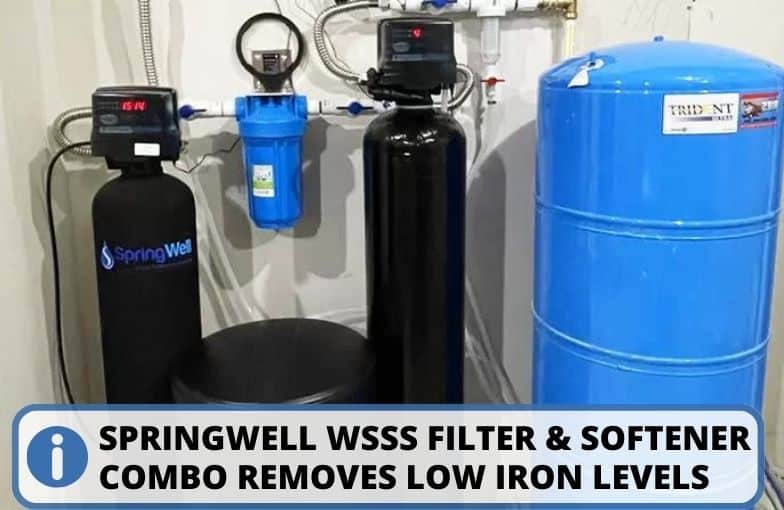
4. Extend the Lifespan of Appliances
Hard water causes the clogging and scaling of your appliances, such as dishwashers, washing machines, and water heaters. A water softener prevents this thing by converting hard water into soft water.
5. Prevent Plumbing Damage
Water softeners are crucial in safeguarding your home’s plumbing system from costly damage caused by hard water deposits and mineral buildup. By preventing the formation of limescale in pipes, these softeners help maintain proper water flow and reduce the risk of blockages.
6. Improve Skin and Hair Health
Soft water benefits your skin and hair health by providing a gentler cleansing experience. Soft water helps maintain your skin’s natural moisture balance and prevents soap scum buildup.
7. Cheap to Run
While the initial installation cost might be high, they are relatively inexpensive to operate and maintain in the long run. The cost of salt and occasional maintenance visits are typically the primary ongoing expenses. Over time, the savings on appliance repair and replacement and reduced plumbing issues can make the softeners a cost-effective solution for many homeowners.
Water Softener Alternatives
If you’re considering alternatives to water softeners, you have several options.
Water Softener Alternatives | Description | Effectiveness | Additional Considerations |
Water Conditioners | Devices that alter the structure of minerals in hard water, reducing limescale deposit formation | Less effective than water softeners as minerals remain in the water | Only remove hardness from water |
Descalers | Systems that use electronic or magnetic forces to prevent limescale buildup | Less effective than water softeners as the minerals remain in the water | Does not remove hardness, only conditions water |
Reverse Osmosis Filter | A filtration system that removes all minerals from water, not just hardness | Effective in removing minerals, including those responsible for hardness | Iron and scale can foul the membrane, reducing effectiveness and increasing maintenance costs |
What is Hard Water?
Hard water is characterized by its high mineral content, primarily consisting of calcium and magnesium ions. These minerals are naturally dissolved in water as they flow through underground rock formations, making hard water a common occurrence in many areas.

The presence of these minerals in water can lead to issues such as limescale buildup on fixtures and appliances, reduced effectiveness of soaps and detergents, stiff and rough laundry, and dry skin and hair after bathing.
The following table summarizes the water hardness criteria based on the USGS criteria.
Water Hardness Criteria | Hardness Concentration (grains per gallon, gpg) | Hardness Concentration (milligrams per liter, mg/L or ppm) |
Soft | < 3.5 | < 60 |
Moderately Hard | 3.5 – 7.0 | 60 – 120 |
Hard | 7.0 – 10.5 | 120 – 180 |
Very Hard | > 10.5 | > 180 |
For more details please read my in-depth guide: “Signs Of Hard Water: 6 Important Symptoms and What to Do About It“.
How Can Hard Water Have an Impact?
After reading all this discussion, one question might be pricking in your mind: why am I so against hard water? The thing is that I don’t have any personal grudges against it. As it contains essential minerals like calcium that contribute to a balanced diet and water has an improved taste.
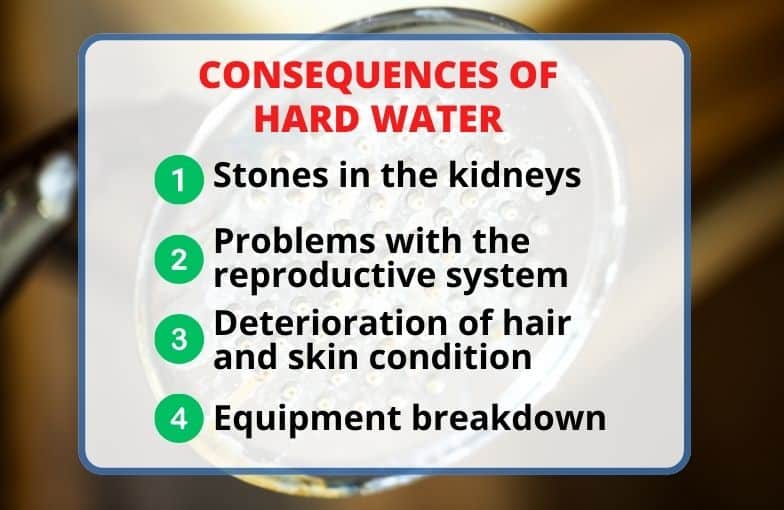
However, Hard water has more disadvantages compared to its perks. But don’t take my word for it; have a look at the following points:
- Risk of kidney stones: Many studies show that hard water doesn’t pose potential health risks like cancer and cardiovascular diseases, as they are just rumors. However, research published in AIP Publishing says that hard water can cause kidney stones. Although it’s unclear to researchers, they still advise the intake of soft water to stay safe.
- Effect on the reproductive system: The second thing that most researchers agree on is that hard water contains calcium, and its excess can hurt male fertility. The intake of fluoride also has negative effects on the reproductive system.
- Effect on appliances and skin: Other than health risks, hard water decreases the lifespan of household appliances and uses more soap and detergents to produce lather. Also, it can cause skin and hair dryness.
An Insight Into the Characteristics of City Water: Is it Hard?
So, if hard water is bad for your health, what about city water? Is this water also unsafe? My sister-in-law asked the same question.
The first thing you should remember is that the city water is tested and goes through multiple processes of cleaning it. But their job is to ensure that you get water that doesn’t harm your health and is safe for everyone.
So what does this mean? It means that the city water doesn’t pose a potential health risk, but it is hard water and will still cause the scale build-up and clogging of pipes. As a result, it will make you spend more on soaps and detergents.
Read Also: Water Softeners for Well Water: Finding the Best Water Softener – Water Treatment
Does Well Give Hard Water?
Okay, how about well water? Since almost 42 million Americans use hard water, is it safe for you? A well usually gives the hard water, but it eventually comes down to the region you live in, as some regions also have soft water. So, you should get your water tested and, based on the report, find an optimal solution if your water is hard.
Here is the map showing the water hardness in the US.
How to Test Hard Water?
Let’s now talk about how to test or identify the hard water. You can identify the hard water through clues like spots and scale buildups on dishes and clothes. But if you are unsure, I recommend you get the water hardness testing kits and test your water.
Moreover, you can get your water tested by professional companies for a detailed report, but it will cost you more.
How to Deal with Hard Water?
I think by now you already know how to deal with hard water – use water softeners. But which one should you choose? I recommend using one of the following options that have been tested by me and my friends personally:
If you want to check out other models, read my article about the best water softeners you can buy on the market.
FAQs
Is it worth having a water softener?
Yes, water softener is a worthy investment as it doesn’t allow for building up scales and minerals. Also, it helps make soap lather and reduces the curds made in washing machines, eventually saving costs.
Is it healthy to have a water softener?
Yes, water softeners are healthy for most people. As with soft water, you can have natural oily skin and smoother hair. However, those who are on a strict sodium diet should avoid salt-based softeners and use salt-free ones.
What can go wrong with water softeners?
Water softeners using sodium pose health risks to those on a limited sodium diet. Also, if the brine waste is not dumped properly, it can harm the soil by making it acidic.
How long should a water softener work?
A water softener should last for at least 15 years. But with proper maintenance, their lifespan can be increased to 20 years.
Is a water softener necessary for well water?
Mostly yes, water softener is necessary for well water, as well water tends to have more minerals than city water. If you live in a region where well water is soft, you won’t need it, so to confirm it you will have to get your water tested.
Can you filter softened water for drinking?
Yes, you can filter softened water. Water with less than 400 ppm of hardness is considered safe for drinking, but if you still want to remove unwanted sodium ions, you can do it by using reverse osmosis.
Conclusion
Summing up the pros and cons of water softeners, you must be informed about your chosen softening system. These system reduces the scale build-ups by removing hard minerals and can improve the effectiveness of soap and detergents. They come in 3 major types: salt-based, salt-free, and dual-tank. So before buying, it is important to know which one would be suitable for your needs.
On the downside, beware that you will be missing the minerals in your water and have to bear the maintenance cost. Also, it is important not to dump their waste on the soil and to keep testing your water occasionally to ensure that the softening system works optimally.

